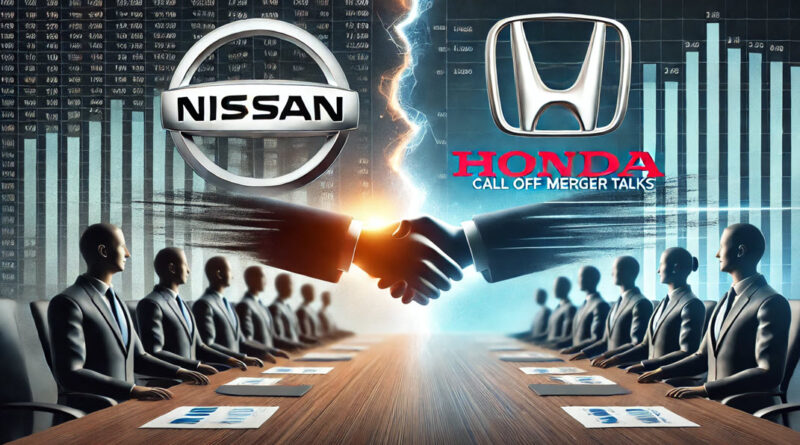Nissan and Honda Call Off Merger Failing to Agree on $58bil Deal
Nissan and Honda call off merger talks, ending months of speculation about a potential $58 billion deal that would have created the world’s third-largest automaker. What could have been one of the biggest shakeups in the auto industry has officially fallen apart. The main reason? They just couldn’t agree on who would be in control. Honda wanted full ownership, while Nissan wasn’t willing to give up its independence. With tensions high and no middle ground in sight, both companies have now walked away from the deal.
So, what happened behind closed doors, and what does this mean for the future of both brands? Let’s break it all down.
What Went Wrong? Why Nissan & Honda Couldn’t Agree
At first, the idea of a Nissan-Honda merger seemed like a perfect match. Both companies are Japanese giants with strengths in different areas—Honda is big on motorcycles and hybrids, while Nissan has strong electric vehicle (EV) technology. Together, they could have been a powerful force against growing competition from Chinese automakers.
But when it came down to the details of the deal, things got complicated.
🔹 Honda Wanted Full Control – Honda insisted that Nissan become a subsidiary, meaning Nissan would lose its independence.
🔹 Nissan Said No – Nissan wasn’t willing to give up control, especially after its rocky history with Renault (which also involved power struggles).
🔹 Financial Differences – Honda is in a stronger financial position, while Nissan has been struggling with declining earnings. The risk of taking on Nissan’s financial issues didn’t sit well with Honda’s leadership.
🔹 Renault’s Opposition – Nissan’s longtime partner Renault wasn’t happy about the deal, adding another layer of resistance.
Without an agreement on who would call the shots, the deal collapsed.
What Happens Now? Nissan & Honda’s Next Steps
Nissan: More Challenges Ahead?
For Nissan, this failed merger is another setback. The company is already dealing with:
Falling sales and profits – Nissan is predicting a $519 million annual loss.
Potential job cuts – With the financial struggles, Nissan may shut down plants and lay off workers.
EV competition heating up – Chinese brands like BYD and NIO are dominating the electric car market, putting pressure on Nissan’s sales.
💡 What Nissan needs to do now:
- Focus on making its EV lineup stronger to compete with Tesla and Chinese brands.
- Rebuild its financial health to avoid further losses.
- Decide its long-term strategy—does it need a new partner, or can it stand on its own?
Honda: Moving Forward Without Nissan
Honda, on the other hand, is in a much better position financially. Unlike Nissan, it isn’t struggling with losses and doesn’t urgently need a merger to survive.
Stronger financial performance – Honda has increased profits and isn’t facing Nissan’s level of struggles.
Electrification strategy continues – Honda is already investing in hybrids and EVs.
No interest in a hostile takeover – Even though the merger didn’t work out, Honda has ruled out trying to force a buyout.
💡 What Honda needs to do now:
- Continue leading in hybrid and motorcycle technology.
- Strengthen its EV strategy to keep up with growing demand.
- Find new partnerships to stay competitive—maybe with a company more aligned with its vision.
What Does This Mean for the Auto Industry?
The collapse of this deal has ripple effects far beyond just Nissan and Honda.
🚗 The Japanese auto industry remains divided – Unlike companies in China, Germany, and the U.S., Japanese brands have struggled to work together. Without this merger, Nissan and Honda remain separate forces in an increasingly competitive market.
⚡ EV wars just got more intense – This merger could have created a major rival to brands like Tesla, BYD, and Volkswagen in the EV space. Now, both Nissan and Honda have to fight separately to stay relevant in the global shift to electric vehicles.
🌍 Other automakers may rethink their strategies – With this deal dead, other companies might start looking for new partnerships or mergers to strengthen their market positions.
Final Thoughts: A Missed Opportunity or the Right Decision?
This could have been a game-changing deal, but in the end, Nissan and Honda couldn’t see eye to eye. Instead of creating a Japanese automotive powerhouse, both companies will now have to compete on their own terms.
👀 What to watch next:
Will Nissan find another partner?
Can Honda dominate the EV market without Nissan?
Will both brands survive the EV revolution on their own?
For now, the $58 billion dream merger is dead, and both automakers are going their separate ways. But in an industry that’s changing faster than ever, who knows what the future holds?
Buying a used VW. Buying used vauxhall, BMW, Jaguar, Ford, Volvo, Range rover, Bentley, Aston Martin, Porsche, Ferrari, Lamborghini, Maserati, Hyundai, Tesla, Honda, Pagani

